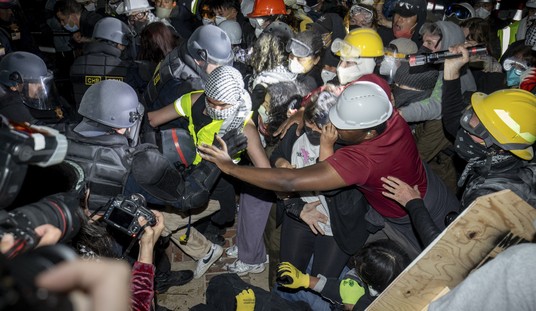The early concerns over the Sochi Olympics focused on security threats, and for good reason. The IOC, in its wisdom, awarded the 2014 Winter Games to an area of Russia that (a) doesn’t get reliable amounts of snow, and (b) happens to be in close proximity to a civil war/rebellion in the Caucasus. So far, things are working out on both fronts, but not without a lot of effort on point (a):
The people in charge of making snow for the Winter Olympics in Russia caught a break over the past two months, when for two periods of about a week each temperatures dropped enough to make good snow, and lots of it.
Over all, their snowmaking machines made enough to cover about 500 football fields to a depth of two feet. Together with some natural snow, that should ensure that the skiing and snowboarding events at the Sochi Games, which open Friday, take place on glistening white pistes, even if rain and warmer temperatures arrive.
“Our goal was to lay down 150 to 175 percent of what was needed,” said Jon Wax, a snowmaker from Wenatchee, Wash., who spent December and January working at Rosa Khutor, the Alpine venue for the Games.
The bigger problem now isn’t snow or security (at least at the moment), but the infrastructure — especially living quarters. With the games about to start and an avalanche of visitors descending on Sochi, the accommodations seem to hearken back to the Soviet era:
Sportswriters from around the world have begun cataloguing a litany of accommodation-related woes in Sochi, Russia as organizers scramble to finish the construction of some hotels three days before the Opening Ceremony of the Winter Olympics, and two days before some competitions get underway.
Journalists have been trickling into the Black Sea resort town all week ahead of the most expensive Winter Olympics in history. Russia has spent $51 billion making all ready for the 17 days of competition, but organizers admitted earlier last week that three of the nine media hotels were not completed.
The Guardian’s Moscow bureau chief Shaun Walker reported
that when he tried to check into his room at midday Tuesday, he was told by a receptionist, “Your room is still under construction. They are literally finishing, the keys are literally coming now.” Three hours later, Walker reported the same receptionist offered him a different room “with no heating, a single bed, and permeated with the odour of industrial glue.”
Twitter heard from Chicago Tribune reporter Stacy St. Clair, who may have explained why vodka is very, very popular in Russia:
https://twitter.com/StacyStClair/statuses/430536725341798402
https://twitter.com/StacyStClair/status/430550673977913344
“Dangerous face water” should be the meme of the year, if you ask me. In fact, as Fox News also links, one sports writer says it’s actually worse in Sochi than during the Soviet era:
I visited the Soviet Union in 1991. Then, I could take a shower in my hotel. In Sochi now? Nyet.
— Nick Cotsonika (@cotsonika) February 5, 2014
At least security appears to be better handled than the rest of the infrastructure. McClatchy reports that athletes are breathing a sigh of relief at what looks to be a competent “ring of steel” at the Olympics sites:
Armed soldiers in hooded drab-green parkas stood guard Tuesday at the end of one runway at the Sochi Airport, where Olympic athletes, spectators and foreign dignitaries are beginning to arrive.
A camouflaged anti-aircraft station rests atop a hill nearby the cluster of ice events stadiums at the Winter Games’ Black Sea coastal venue.
Sochi is beginning to resemble a police state, and that’s just fine with the Olympic athletes, fans and locals.
“I feel pretty good about it, I mean they are trying as hard as they can,” said U.S. bobsled pusher Chris Fogt, an Army captain who worked in intelligence and security in Iraq after the 2010 Vancouver Winter Olympics. “Something happened in Atlanta in ’96, it can happen here. You just hope. I think that they are trying their hardest and they are doing everything they can.”
British short track speed skater Jon Eley said: “The security is good, not over the top, and we feel safe.”
Now if they could just drink the water ….
Update: Speaking of security, don’t connect to the wi-fi networks, either:
“As tourists and families of athletes arrive in Sochi, if they haven’t been warned, and if they fire up their phones at baggage claim, it’s probably too late to save the integrity of their electronics and everything inside them. Visitors to Russia can expect to be hacked. And as Richard Engel found out upon his arrival there, it’s not a matter of if, but when,” reports NBC’s Brian Williams.
Engel says, “The State Department warns that travelers should have no expectation of privacy. Even in their hotel rooms. And as we found out, you are especially exposed as soon as you try and communicate with anything.”
“One of the first thing visitors to Russia will do is log on,” says Engel. “Hackers here are counting on it.”
What a wonderful venue the IOC chose! What’s next, Summer Games in Kim Jong-un’s gulag?








Join the conversation as a VIP Member